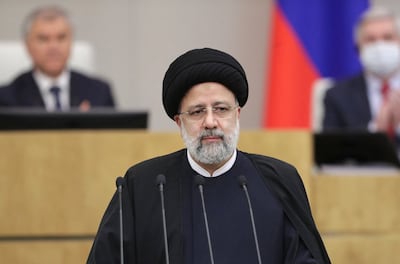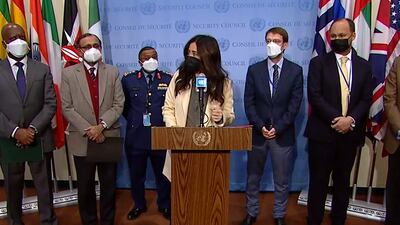By far the most encouraging aspect of the UN Security Council’s unanimous decision to condemn this week’s strikes on Abu Dhabi was Russia’s decision to join other major powers in denouncing Yemen’s Iranian-backed Houthi rebels for carrying out the attacks.
Previously, Moscow has proved reluctant to support any public condemnation of the Houthis at the UN because of the nuanced diplomatic relationship Russia enjoys with Iran, a key supporter of the Houthi cause.
In previous Security Council discussions concerning Yemen’s long-running civil war, Russia has been reluctant to support any public criticism of the Houthis or their Iranian backers in the conflict.
In 2018, for example, when the 15-member council discussed a resolution drafted by Britain to condemn Iran for violating the arms embargo enacted against Houthi leaders, Russia refused to support the initiative because it directly aimed criticism towards Iran.
As one of five permanent members of the Security Council, Russia has the right to veto any initiatives undertaken by other council members with which it disagrees, and Moscow has often used its privileged position to obstruct initiatives relating to the Yemen conflict on the occasions that they have involved criticising the conduct of the Houthis and their Iranian sponsors.
So the fact that Russia has given its backing to Friday’s unanimous Security Council resolution to condemn the Houthi operation against Abu Dhabi as “heinous terrorist attacks” represents a welcome change in Moscow’s attitude towards the conflict, one that could have significant implications for Russia’s future approach to the long-running Yemen conflict.
The resolution certainly contains some of the strongest criticism the council has directed at the Houthis, declaring the need “to hold perpetrators, organisers, financiers and sponsors of these reprehensible acts of terrorism accountable and bring them to justice".
Russia’s support for the motion, moreover, will lend it added weight, as it suggests both the Houthis and their Iranian backers can no longer rely on Moscow to defend their actions in the Yemeni conflict.
Moscow's decision to support the resolution also raises a number of intriguing questions about the nature of its long-standing ties with Tehran as talks on the future of Iran’s controversial nuclear programme reach a crucial juncture.

In recent years, Russia and Iran have forged a close alliance based on shared goals, such as their military co-operation in supporting the Assad regime in the Syrian conflict. Russia has also been providing Tehran with diplomatic support during attempts to revive the nuclear talks, with Moscow supporting Iranian attempts to resist pressure from the Biden administration to expand the scope of the original 2015 nuclear deal to include other aspects of Iran’s nuclear activities, such as the development of ballistic missiles capable of carrying nuclear warheads.
But there has been growing evidence of strain appearing in the Russo-Iran alliance in recent months, with Russia, for example, taking no action to prevent Israeli air strikes against Iranian positions in Syria.
Russia’s decision to support the Security Council resolution on this week’s Houthi attacks on Abu Dhabi could therefore signify a refreshing change of approach by Moscow, both to its erstwhile ally in Tehran as well as the Houthi rebels.


